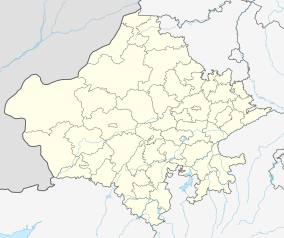Sariska National Park
| Sariska | |
|---|---|
| Sariska Tiger Reserve | |
|
IUCN category II (national park)
|
|

A deer in Sariska Reserve
|
|
| Location | Alwar District, Rajasthan, India |
| Nearest city | Alwar |
| Coordinates | 27°19′3″N 76°26′13″E / 27.31750°N 76.43694°ECoordinates: 27°19′3″N 76°26′13″E / 27.31750°N 76.43694°E |
| Area | 866 km2 (334 sq mi) |
| Established | 1955 |
| Governing body | Project Tiger, Government of Rajasthan, Wildlife Warden, Sariska National Park |
| www |
|
Sariska Tiger Reserve is a national park and tiger reserve located in the Alwar district of the state of Rajasthan, India. The topography of the protected area comprises scrub-thorn arid forests, rocky landscapes, dry deciduous forests, rocks, grasses and hilly cliffs. This area was a hunting preserve of the Alwar state and it was declared a wildlife reserve in 1955. It was given the status of a tiger reserve making it a part of India's Project Tiger in 1978. The wildlife sanctuary covers an area of 866 km2 (334 sq mi). The reserve was declared a national park in 1982, with a total area of about 273.8 km2 (105.7 sq mi). It is the first reserve in the world to have successfully relocated tigers.
The park is situated 106 km (66 mi) away from Hindaun, 107 km (66 mi) from Jaipur and 200 km (120 mi) from Delhi. It is a part of the Aravalli Range and the Kathiawar-Gir dry deciduous forests' ecoregion. It is rich in mineral resources, such as copper. In spite of the Supreme Court's 1991 ban on mining in the airarea, marble mining continues to threaten the environment.
In 2004, there were strong and persistent reports that no Bengal tigers were being sighted in the reserve. It was not only that tigers were not being seen but also and more alarmingly, there was no indirect evidence of the tigers' presence (such as pugmarks, scratch marks on trees, etc.). The Rajasthan Forest Department took the stand that "the tigers had temporarily migrated outside the reserve and would be back after monsoon season". Project Tiger, now National Tiger Conservation Authority (NTCA), backed this assumption. There were 16 tigers in the previous year. In January 2005, journalist Jay Mazoomdaar broke the news that there were no tigers left in Sariska. Soon the Rajasthan Forest Department and the Project Tiger Director declared an "emergency tiger census" in Sariska and the Central Bureau of Investigation, India's intelligence agency, conducted a probe. After a two-month investigation they finally declared that Sariska did not have any tigers left. Poaching was blamed for the disappearance of tigers. In order to repopulate Sariska with tigers, three tigers were relocated to the reserve and authorities planned to relocate two more tigers by the end of the following year. Recently, two tiger cubs and their mother were spotted in the reserve bringing the total number of tigers to seven with five adults. In July 2014, 2 more tiger cubs were spotted taking the total of tigers in the reserve to 11 with 9 adults. Two cubs were further sighted in August 2014, making the total of tigers in Sariska to 13, with 7 females, 2 males and 4 cubs. This significant increase in tigers' population has been welcomed by wildlife enthusiasts and therefore the footfall has been increased by a huge amount.
...
Wikipedia

